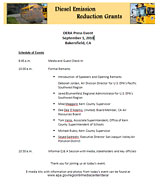Pacific Southwest, Region 9
Serving: Arizona, California, Hawaii, Nevada, Pacific Islands, Tribal Nations

Diesel Emission Reduction Grants throughout the San Joaquin Valley
Public Invitation to the Event
Schedule of Events
9:45 Media and guest check-in
10:00 Formal Remarks
- Introduction of Speakers and Opening Remarks: Deborah Jordan, Air Division Director for U.S. EPA’s Pacific Southwest Region
- Jared Blumenfeld, Regional Administrator for U.S. EPA’s Pacific Southwest Region
- Mike Maggard, Kern County Supervisor
- Michael Rubio, Kern County Supervisor
- Seyed Sadredin, Executive Director San Joaquin Valley Air Pollution District
10:30 Informal Q&A session with media, stakeholders and key officials
Location: Bakersfield, CA
Contact Information
More information about the West Coast Collaborative
More information on USEPA’S National Clean Diesel Campaign
For Further Information
Cara peck (415) 972-3382
Fact Sheet
Since 2008, the United States Environmental Protection Agency (EPA) awarded over $29 million in diesel emission reduction grants in the San Joaquin Valley through the EPA’s West Coast Collaborative (WCC). This funding will reduce diesel emissions while protecting public health throughout the Valley.
Emissions from diesel engines found in trucks, ships, locomotives, agricultural and construction equipment — especially the microscopic soot known as “particulate matter” (PM) — cause serious health problems for adults and have extremely harmful effects on children and the elderly. Public health authorities associate exposure to PM with anincreased risk of premature death, greater number of hospital admissions for heart and lung disease, and amplified adverse respiratory symptoms such as asthma. Long-term exposure to diesel exhaust may also pose a lung cancer hazard to humans.
In 2005, strong bipartisan support for emissions reductions and public health improvements led Congress to enact the Diesel Emission Reduction Act (DERA), which provides grant funding to government agencies, non-profit organizations, and academia to reduce diesel air emissions. Since then, DERA’s grant programs have supported the EPA National Clean Diesel Campaign (NCDC) and seven Regional Diesel Collaboratives in their efforts to accelerate the use of cleaner diesel technologies nationwide.
DERA is a successful federal program from both an economic and public health perspective. Within NCDC’s West Coast Collaborative, comprised of EPA Regions 9 and 10, DERA grant projects produce over $3 billion in public health benefits, and for every federal dollar invested an average of $38 dollars in health benefits is realized. DERA will expire in 2011, without Congressional reauthorization.
Summary of Grants:
EPA Grant Funding = over $29 Million
Matching Funds = over $63 Million
Engines Upgraded = 714
Monetary Health Benefits = over $146 Million
Emission Reductions (project lifetime):
Nitrogen Oxides (NOx) = over 37,000 tons
Particulate Matter (PM) = over 1,800 tons
Cleaner Diesel Grants:
Kern County and the Southern San Joaquin Valley = $2,380,000
- $540,000 to the Kern County Superintendent of Schools to replace six 1987-89 model year school buses with Compressed Natural
- Gas (CNG) buses. These funds leveraged $340,000.
- $240,000 to the Kern County Superintendent of Schools for replacing five diesel buses with CNG and/or propane school buses. These funds leveraged $950,000.
- $1,600,000 to San Joaquin Valley Air Pollution Control District (SJVAPCD) for cleaner air demonstration and deployment technologies through the District’s Technology Advancement Program, which will be targeted in the Southern Valley.
Cleaner Diesel Grants:
Throughout the Greater San Joaquin Valley = $26,847,523
- $16,522,000 to the SJVAPCD to retrofit and replace 474 pieces of equipment, including agriculture tractors and pumps, school buses, and switcher ocomotives. These funds leveraged over $17 million.
- $4,000,000 to the SJVACD to replace 73 school buses model year ranging from 1977 to 1980. Thirty will have 2010 emission compliant CNG engines, while the remaining 43 will have 2007 or newer diesel engines. This funding was provided under the American Recovery and Reinvestment Act (Recovery Act). These funds leveraged over $39 million.
- $2,000,000 to the SJVAPCD, under the Recovery Act, to repower 30 agricultural off-road vehicles with new engines that exceed more stringent standards for non-road diesel engine. These funds leveraged over $635,000.
- $16,522,000 to the SJVAPCD to retrofit and replace 474 pieces of equipment, including agriculture tractors and pumps, school buses, and switcher locomotives. These funds leveraged over $17 million.
- $4,000,000 to the SJVACD to replace 73 school buses model year ranging from 1977 to 1980. Thirty will have 2010 emission compliant CNG engines, while the remaining 43 will have 2007 or newer diesel engines. This funding was provided under the American Recovery and Reinvestment Act (Recovery Act). These funds leveraged over $39 million.
- $2,000,000 to the SJVAPCD, under the Recovery Act, to repower 30 agricultural off-road vehicles with new engines that exceed more stringent standards for non-road diesel engine. These funds leveraged over $635,000.
- $1,796,474 to the SJVAPCD to replace approximately 48 on-road heavy-duty trucks with new clean diesel trucks that will operate throughout the San Joaquin Valley. These funds leveraged over $5 million.
- $1,260,906 to the SJVAPCD, under the Recovery Act, for 33 Class-8 long-haul diesel trucks that travel in the San Joaquin Valley will be retrofitted with emerging selective catalytic reduction technologies to promote emerging technologies.
- $1,000,000 to California Air Resources Board (CARB) to repower a switch yard locomotive with a new Tier 3 engine that will operate in the Valley. These funds leveraged $500,000.
- $173,000 to CARB to provide grants to school districts to retrofit nine school buses in the Valley with verified Level 3 devices. The retrofit devices reduce PM emission by 85%.
- $95,143 to California Department of Transportation (Caltrans), through CARB, to replace five heavy-duty dump trucks, wreckers and trash trucks with newer vehicles that will operate in the Valley.
| Pacific Southwest NewsroomPacific Southwest Programs | Grants & FundingUS-Mexico Border | Media Center Careers | About EPA Region 9 (Pacific Southwest)A-Z Index |


